The Trump Administration Owns the Surge in White Nationalist Violence
Both the FBI and the Department of Homeland Security issued warnings about the far right. New reporting finds no one wanted to listen.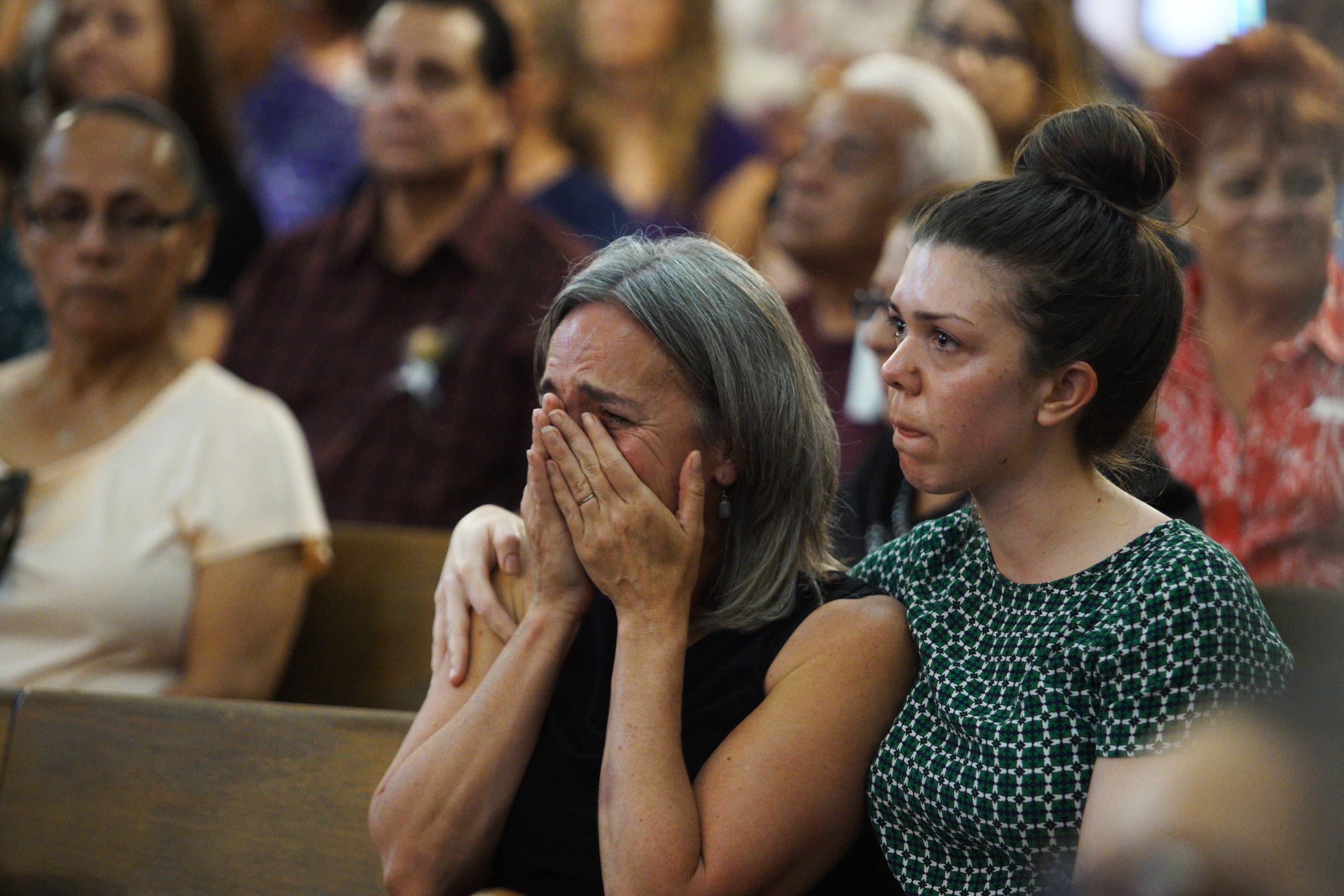 Mourners attend a service for Margie Reckard, who was killed in a mass shooting in El Paso, Texas, this month. (Jorge Salgado / AP)
Mourners attend a service for Margie Reckard, who was killed in a mass shooting in El Paso, Texas, this month. (Jorge Salgado / AP)
What follows is a conversation between attorney Greg Huffman and Jacqueline Luqman of The Real News Network. Read a transcript of their conversation below or watch the video at the bottom of the post.
JACQUELINE LUQMAN: This is Jacqueline Luqman with The Real News Network.
The role of the Department of Homeland Security and the Federal Bureau of Investigation are very different in the U.S., depending on who you ask. But there was one time that these agencies actually carried out their mission to protect citizens from what they identified as a growing domestic threat. But did anyone listen when DHS and the FBI sounded the alarm about this domestic threat, and did that response–or non-response–help cultivate the environment we are in right now?
Joining me to talk about this is Greg Huffman. Greg is a lawyer, currently of counsel for Milazzo Webb in Charlotte, North Carolina and contributor to Facing South, the online magazine for the Institute for Southern Studies, which is a nonprofit research and media center that exposes injustice, strengthens democracy, and builds a community for change in the South. Welcome, Greg.
GREG HUFFMAN: Thank you.
JACQUELINE LUQMAN: And with me also is Daryl Johnson. Daryl is the owner of DT Analytics and is the author of two books; the first, Hate Land: A Long, Hard Look at America’s Extremist Heart, and the second, Right Wing Resurgence: How a Domestic Terror Threat Is Being Ignored. Welcome, Daryl.
DARYL JOHNSON: Thank you.
JACQUELINE LUQMAN: Now Daryl, I want to start with you first because it is that second book that is the topic of this discussion, and that book is based on something you are intimately familiar with. you’re not just a career intelligence analyst, you’re not just the author of these two books which are about the rise of violent extremism in America, but you’re the former head of the DHS intelligence team that tracked and help write a report about the rise of white supremacists’ terrorism that was all but dismissed back in 2009 right?
DARYL JOHNSON: That’s correct. That report actually started in January of 2007 with a call from the U.S. Capitol Police, who asked us to monitor the web for any threats against then-Senator Barack Obama, who was going to announce his candidacy for president. So that’s the genesis of the report. So I postulated, “What if?” What if our first African American presidential candidate got elected and became president? What would that do to the threat landscape?
JACQUELINE LUQMAN: So that’s what your team began tracking. Just one call from the Capitol Police saying, “Hey, this senator who just happens to be black, and who might just happen to be the first black president of the United States of America, is running for president. What could happen?” was basically what you started with. So what happened after you began tracking then-Senator Obama and the online activity between him announcing his candidacy and becoming elected?
DARYL JOHNSON: Yeah. So for about a month or two, we monitored the web when he made his announcement and we didn’t see any threats. It’s only when he won the Democratic nomination leading up to the 2008 election that we started seeing the threats rolling in. And so, as we saw these threats coming in on the internet, we referred them to both the Capitol Police and U.S. Secret Service. By 2009, President Obama had now taken office, and that’s when we started seeing a lot of these groups recruiting and becoming radicalized. And we actually saw the first two violent attacks within a week of the election.
JACQUELINE LUQMAN: So where does the report come in in this timeline of you becoming aware of Senator Obama’s candidacy, then his election, then the spike in threats against now-President Obama?
DARYL JOHNSON: Yeah. So we basically were in collection mode from January 2007 all the way up to November 2008. It’s only when Barack Obama won the presidency that we actually started putting pen to paper.
JACQUELINE LUQMAN: So what was it about this report that was so controversial? First, let me ask you, did you think this report was going to be controversial?
DARYL JOHNSON: Not really, because I was fortunate enough to have an entire staff of attorneys and privacy lawyers and civil rights advocates, as well as the FBI and multiple editors. So this report went through 23 rewrites in the course of about five months and went through three levels of editing. So we were very confident that the report was sanitized enough and would meet the threshold of any criticism.
JACQUELINE LUQMAN: Could you explain for our viewers what you mean when you say sanitized enough? What was it sanitized of?
DARYL JOHNSON: Yeah. So we wanted to be particularly careful not to put a lot of people’s–U.S. persons we call them, or citizens–names in the report. You’ll see that there’s only one person that’s actually named in that report, and that was Timothy McVeigh, and he’s a convicted terrorist and now deceased. But we wanted to be sensitive. We didn’t want to mention any groups or any movements or any people that had been recently arrested because we didn’t want that to distract from the message of the report.
JACQUELINE LUQMAN: And what was the ultimate message of the report, Daryl?
DARYL JOHNSON: So that report was meant as a warning to state local law enforcement, as well as our federal counterparts, that we were going to see a change in the threat landscape from primarily focusing on Al-Qaeda and Muslim extremists here in the United States to more of the white supremacists and anti-government types.
JACQUELINE LUQMAN: So the report outlined that a shift in the domestic threat from so-called Islamic extremists to white supremacists and far right groups.
DARYL JOHNSON: Right. We weren’t trying to dismiss the Islamic extremist threat. We just wanted policymakers, police chiefs, police superintendents to realize that they’re going to have to devote resources equally to these threats rather than exclusively focusing on Muslim extremists.
JACQUELINE LUQMAN: And now this is where the politics of the situation comes in. And now, Greg, I want to turn to you, because your article in Facing South highlights the role that particularly Southern and mostly Republican politicians played in discrediting this report–which, by the way was leaked, correct? It wasn’t published. Is that accurate?
GREG HUFFMAN: That’s accurate. I believe there were two versions of the report. There was a classified version and there was a version that was meant for distribution at some point to state and local law enforcement, and it was that version that got leaked.
JACQUELINE LUQMAN: The state and local law enforcement version.
GREG HUFFMAN: Right.
JACQUELINE LUQMAN: Now, what were the criticisms from these politicians about this report? Why did they have such a problem with what was in the report?
GREG HUFFMAN: They basically said that the report cast anyone with certain conservative Republican views, like anti-abortion views or anti-government views, as terrorists. They also said that it slurred veterans, because the report did have a section that discussed the risk of recruitment of veterans by extremist organizations.
JACQUELINE LUQMAN: So now Daryl, even though at the time these politicians claim that the report smeared veterans and it disparaged people with certain conservative or right-leaning political views, is that what the report actually said?
DARYL JOHNSON: No. In fact, in the scope note, it talks about violent extremism and terrorism. A third thing that people objected to was the use of the term right-wing, which people equated to the Republican Party and the Tea Party, but that is a legitimate counter-terrorism term. It’s been in the FBI’s lexicon for the past three decades. Nobody objected to the FBI using that term, but they certainly objected to DHS using it in the aftermath of the Republican losses of the 2008 election.
JACQUELINE LUQMAN: Now, this is getting really interesting. Because now we’re looking at something that, Daryl, from your point of view as an intelligence analyst, you were pursuing this as a matter of public safety, right? There was nothing personal or political in this for you as you and your team were tracking these threats and reporting on them.
DARYL JOHNSON: That’s correct. And I guess many Republicans were surprised when I finally came public and acknowledged that I’m a third-generation Republican myself. I was raised a Mormon, so I’m a very conservative individual. I have similar views as the Republican Party does on gay marriage and gun rights and abortion and other things. But yet, I could set aside my political beliefs and be objective and report on the threat as I see it.
JACQUELINE LUQMAN: So I want to ask you how you felt as you began to see the political backlash of this report that you released because of the work that your team was doing to address a public safety threat. How did you feel, Daryl, as this became a political weapon?
DARYL JOHNSON: Yeah, it was very discouraging. I was frustrated with Homeland Security’s very weak response. They never even came to me or my analysts for any type of talking points or counterpoints, so it was very frustrating. It was also surreal to see an intelligence assessment meant for law enforcement being dissected on Fox News, and people trying to read into it and spin it for their political reasons.
JACQUELINE LUQMAN: All right. Now I want to come back to you, Greg, because I’m glad that Daryl brought up Fox News, because you talked about the conservative commentators on that network pillorying the report over and over again. I think it’s easy to criticize the Republicans for their response to the report. But you also bring up, in your article in Facing South, the Democrats’ response to not necessarily the report so much, but the Democrats’ response to the Republicans’ response to the report. Can you go into that a little bit?
GREG HUFFMAN: Yeah. There was very little disagreement from the Democrats. There was either silence or a very tepid, bland rebuttal. For example, the White House really gave the DHS no support at all in regard to the report. And actually, the committee chairman of the House Homeland Security Committee actually kind of sided with the Republicans in expressing concerns about the report, and was kind of headed toward letting them investigate the investigators at one point.
JACQUELINE LUQMAN: And just to be clear, this is the Obama White House?
GREG HUFFMAN: Right.
JACQUELINE LUQMAN: The same White House that the report–the report existed because of the uptick in threats of violence against President Barack Obama because he was the first black president of the United States of America.
GREG HUFFMAN: Correct.
JACQUELINE LUQMAN: So… Oh, I’m sorry. Please continue.
GREG HUFFMAN: No. I mean, you almost got the sense that this newly-elected administration didn’t have the appetite or feel like it had the political capital at the moment to really fight this fight.
JACQUELINE LUQMAN: In fact, weren’t there congressional hearings about this report, Greg? But the hearings, pretty much… Well, what happened with the hearings? What happened with the congressional hearings?
GREG HUFFMAN: The Homeland Security Committee was headed toward having a hearing, and then they kind of pulled back and ended up rolling some questions about the report itself into a budget hearing in May of 2009. And it was apparent from the discussion in the committee that Secretary Napolitano had done a lot of damage control behind the scenes with the Republican members of the committee, as well as the chair of the committee, Bennie Thompson from Mississippi. They didn’t discuss the report in detail, and they didn’t discuss the threat assessments. The Republican members just expressed their displeasure about the mention of veterans and the broad definition of right-wing.
JACQUELINE LUQMAN: Daryl, I see you nodding your head over in your frame. Now, even though the Obama administration actually did establish and fund a task force in 2011 to address the rise in white supremacist–or at least domestic–terrorism, it didn’t seem to have the impact it should have in curbing this problem that your team and your report raised. Why do you think that is?
DARYL JOHNSON: Well, this whole topic of domestic terrorism is a political minefield. You’re talking about very divisive issues here in America, like gun rights, abortion rights, immigration, and other topics. And so, these issues, depending on how politicians react to them, could impact them on the next election. So a lot of them bury their head in the sand and just don’t want to confront the problem.
JACQUELINE LUQMAN: Let me go back to you Greg, and ask, since you do focus on the Southern Republicans who were instrumental in blocking any kind of substantive review and examination of this report. Since these horrific violent attacks have occurred, these horrible terrorist murders have occurred in the past few weeks–let alone the past few years–that we have seen, has anyone taken any of these politicians who are still in office to task, who were involved in squashing this report back in 2009? Has anyone brought this to their attention for them to answer for?
GREG HUFFMAN: Not in any substantive way. I think a lot of people over the years have forgotten about this report until it became much more public in the last several weeks. But to my knowledge, it really has not been an issue probably since 2009, and then I think it cropped up again around 2012. But otherwise, there hasn’t been a lot of very public discussion about it.
JACQUELINE LUQMAN: So Daryl, let me ask you, to piggyback on that. Recently, there was another leaked document that exposed the FBI’s tactic of focusing on black activists after the Ferguson uprising, categorizing them as “black identity extremists,” even though the same report lists militia extremists and white supremacists as a higher threat level than these so-called black identity extremists. And just a week ago, it was revealed that the Trump administration blocked the release of another document confirming the rise in white supremacist/far right extremist violence and murders, even as this administration has defunded the very programs that were implemented to stop them under the Obama administration. Daryl, do you believe the politically-motivated campaign to discredit your team’s report, and their work, contributed to this environment where these political actions are taking place now, to the deadly detriment of citizens?
DARYL JOHNSON: Yeah. So I guess one of the aftermath of the backlash of my report in 2009 is the fact that it created a chilling effect within both the law enforcement and intelligence communities, which sent a message that “If you’re going to write about these topics, we’re going to expose you and we’re going to take things out of context. We’re going to spin it, and we’re going to raise hell to make you stop focusing on this and to deter you from focusing on this topic.” So that’s the unfortunate thing that’s happened. The warning and the indication that we gave to policymakers very early on, which could have helped us in the long run develop programs and mature them to the point where we could actually do some prevention, it stopped everything. And nobody’s really paid attention to this threat until the attacks become more frequent and the body counts keep getting bigger and bigger.
JACQUELINE LUQMAN: So is it just easier for some law enforcement agencies to just direct all their attention toward so-called “black identity extremists,” even though they are clearly not the threat, as opposed to actually following the trail of violence–and I’ll just go ahead and say the trail of blood–that leads right back to white supremacists and far right extremists?
DARYL JOHNSON: Right. And so, black nationalists that are violent fall on the left, far left of the political spectrum, as does the antifa. And so, I find it kind of frustrating and a little bit of a hype to put these other left-wing groups–which antifa really hasn’t turned into the level of violence that white supremacy has, as far as killing and murdering people. We did have a micro-trend of violent black nationalists back in 2016 and 2017 where we had police officers killed and ambushed by black nationalists, but that’s since stopped. And still, the white supremacy threat has been persistent year after year after year, for at least the past decade.
JACQUELINE LUQMAN: So I’m going to ask this last question for both of you. And Greg, I want you to answer first. What has to happen now politically to turn this tide, if anything can be done at this point?
GREG HUFFMAN: I think at some point, Congress is going to have to have a serious discussion about whether or not federal law enforcement has adequate surveillance tools and enforcement tools to stop some of these attacks before they can happen. Right now, they don’t. The federal agencies don’t even have the same definitions internally of right-wing domestic terrorism. They all treat things differently. A lot of them treat these as simple criminal matters. I don’t want to say simple to be dismissive, but that’s how they have to treat them because that’s what the federal statutes require.
And then the second thing really is that the administration needs to stop affirmatively sending signals to right-wing extremists. What I mean by that is the Trump administration, within the last several years, has issued pardons to people that have been involved in white nationalist and anti-government activities; Joe Arpaio, some ranchers out West who are tied to the militia movement. And then Conrad Black, who is a Canadian media mogul who has been very supportive of Canadian white nationalist political candidates, and some of those folks have appeared on Neo-Nazi websites and were active in Charlottesville. So it’s stuff like that.
JACQUELINE LUQMAN: So Daryl, once again I see you nodding your head in agreement. I’m going to leave you the last word on this topic. What needs to be done, if anything else can be done, to stop this tide?
DARYL JOHNSON: Yeah. I agree with everything that Greg’s brought up, all of his points. I would add to it that it all starts with acknowledging the threat. Stop dismissing it as random acts of a crazed gunman or trying to say mass shootings that murder dozens of people is a hate crime. You need to acknowledge this as terrorism; it’s ideologically-motivated violence meant to instill fear in a community or change government policy. So it all starts with acknowledging it as terrorism. Then we can track it because you’re acknowledging incident after incident, and we can devote more money and resources to the problem to combat it.
JACQUELINE LUQMAN: Well, I wish we had more time to continue parsing through this subject, but we do not. We have to leave this discussion here. I want to thank you both for joining me today to delve into this very important and overlooked topic and moment in history. I appreciate you both for being with me.
DARYL JOHNSON: Thank you.
GREG HUFFMAN: Thank you.
JACQUELINE LUQMAN: And thank you so much for watching. Sadly, I’m sure we will continue to grapple with this deadly issue. Continue to watch us here at The Real News Network. This is Jacqueline Luqman from Baltimore.
DHARNA NOOR: Hey you all, my name is Dharna Noor, and I’m a climate crisis reporter here at the Real News Network. This is a crucial moment for humanity and for the planet. So if you like what we do, please, please support us by subscribing at the link below. Thank you.
Your support matters…
Independent journalism is under threat and overshadowed by heavily funded mainstream media.
You can help level the playing field. Become a member.
Your tax-deductible contribution keeps us digging beneath the headlines to give you thought-provoking, investigative reporting and analysis that unearths what's really happening- without compromise.
Give today to support our courageous, independent journalists.

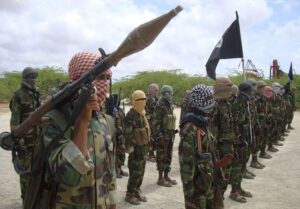
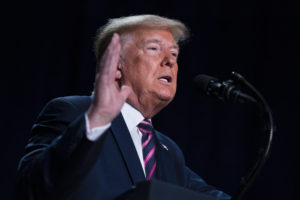
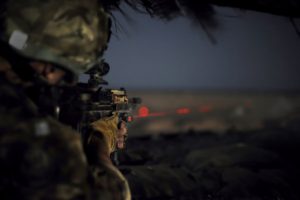
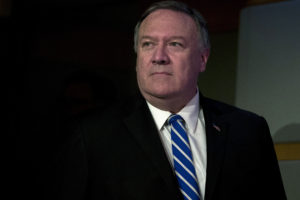
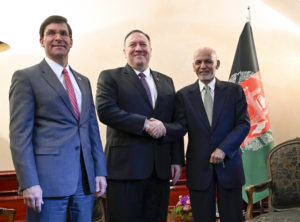
You need to be a supporter to comment.
There are currently no responses to this article.
Be the first to respond.